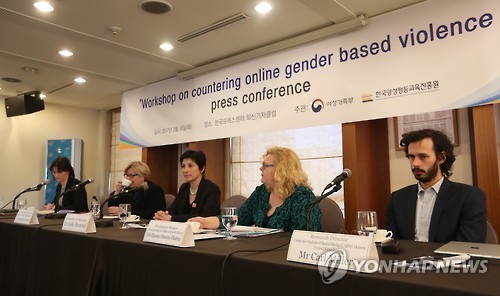Advent of the Internet is like a double-edged sword. Anyone with a smartphone today can express their views online and exercise their freedom of speech.
Unfortunately, it comes at a cost -- of also empowering misogynists to engage in unfettered gender-based violence.
A key way to fight this alarming trend? Strike directly at the core of the problem -- online communities where anonymous trolls share and reinforce their misinformed views -- and puncture them, a group of European experts advised.
 |
A group of European experts, including Joelle Hivonnet (C), deputy head at the E.U. Delegation in Seoul, speak to reporters at a press conference in northern Seoul on March 14, 2017, on the rising phenomenon of online gender-based violence. (Yonhap) |
"What the government as well as civic societies and the mainstream media needs to begin to do is to puncture these echo chambers," Carl Miller, research director at the London-based Center for Analysis of Social Media, said at a recent press conference in Seoul.
Miller was among a group of European experts -- including Joelle Hivonnet, political head of the EU Delegation in Seoul and Liesbet Stevens, deputy director of the Belgian Institute for Equality of Women and Men -- who were invited to a forum on online violence by the Korean Institute For Gender Equality Promotion and Education held at the National Assembly on Wednesday.
"One of the things that the Internet allow to be created are what we call echo chambers. Communities which are united in having a single point of view about the world," Miller explained.
Miller added "we need to get other kinds of messages in there in order to introduce new information."
Hivonnet underscored that Europe is also seeing this trend expanding at a dangerously fast rate, directly weighing down the region's economy.
"The total cost of gender based-violence stands at 226 billion euros, which is approximately 3.26 trillion won ($2.83 billion won)," she said, stressing that the negative impact of gender-based violence runs much deeper and wider than apparently conceived.
Hanna Onwen-Huma, a researcher at Finland's National Health and Welfare, noted that the rise of gender-based violence has its roots in the cognitive discrepancies caused by changing social norms relating to gender.
She explained that the Finnish society has matured so as to accept "girls to be masculine." But according to Onwen-Huma, it's still "not okay for boys to be feminine."
"Not all of our boys fit into this box (representing societal perception of masculinity)," said Onwen-Huma, and argued that the boundary of the "box" should expand.
Jackie Jones, law school professor at the University of West England, noted that gender-based violence isn't just a feminist issue and stressed the importance on educating people -- both young and old -- on forming healthy relationships to cope with problems stemming from the expansion of violent pornography. (Yonhap)






![[Exclusive] Hyundai Mobis eyes closer ties with BYD](http://res.heraldm.com/phpwas/restmb_idxmake.php?idx=644&simg=/content/image/2024/11/25/20241125050044_0.jpg)
![[Herald Review] 'Gangnam B-Side' combines social realism with masterful suspense, performance](http://res.heraldm.com/phpwas/restmb_idxmake.php?idx=644&simg=/content/image/2024/11/25/20241125050072_0.jpg)
